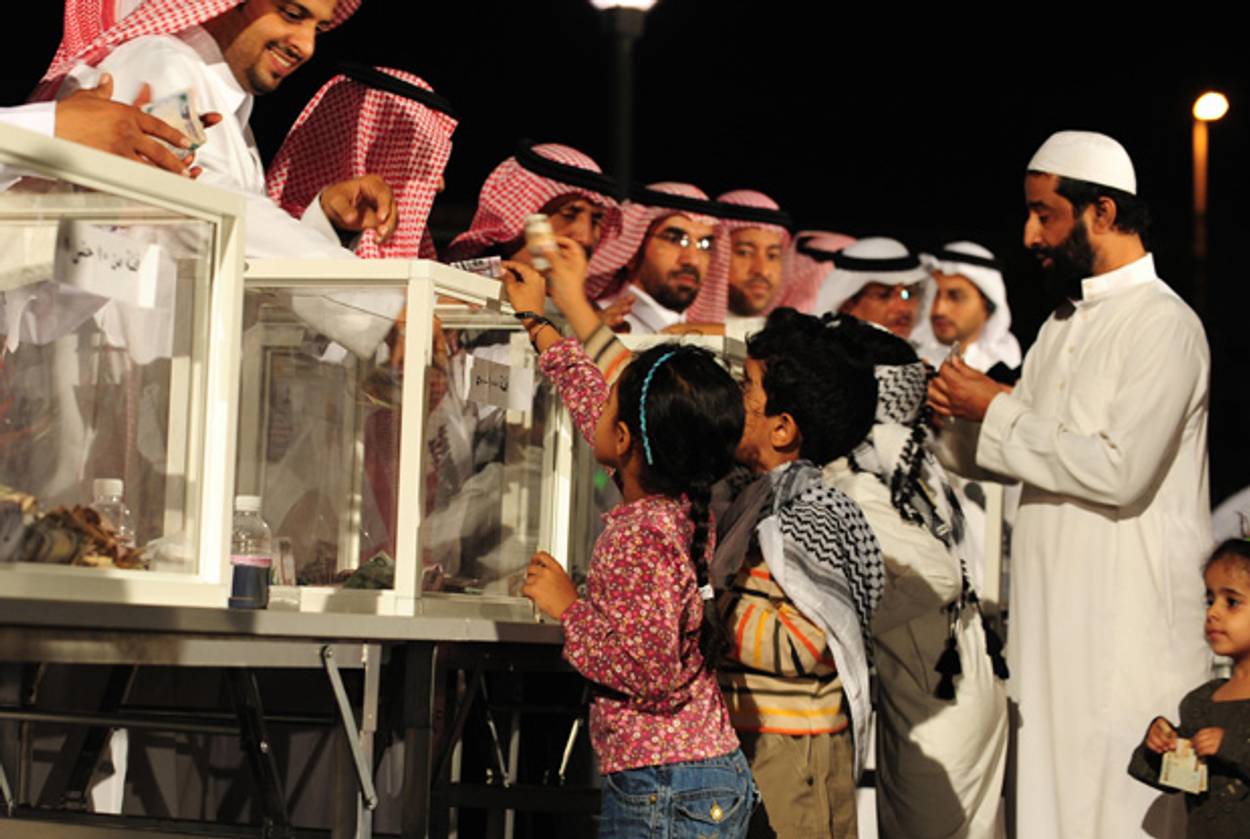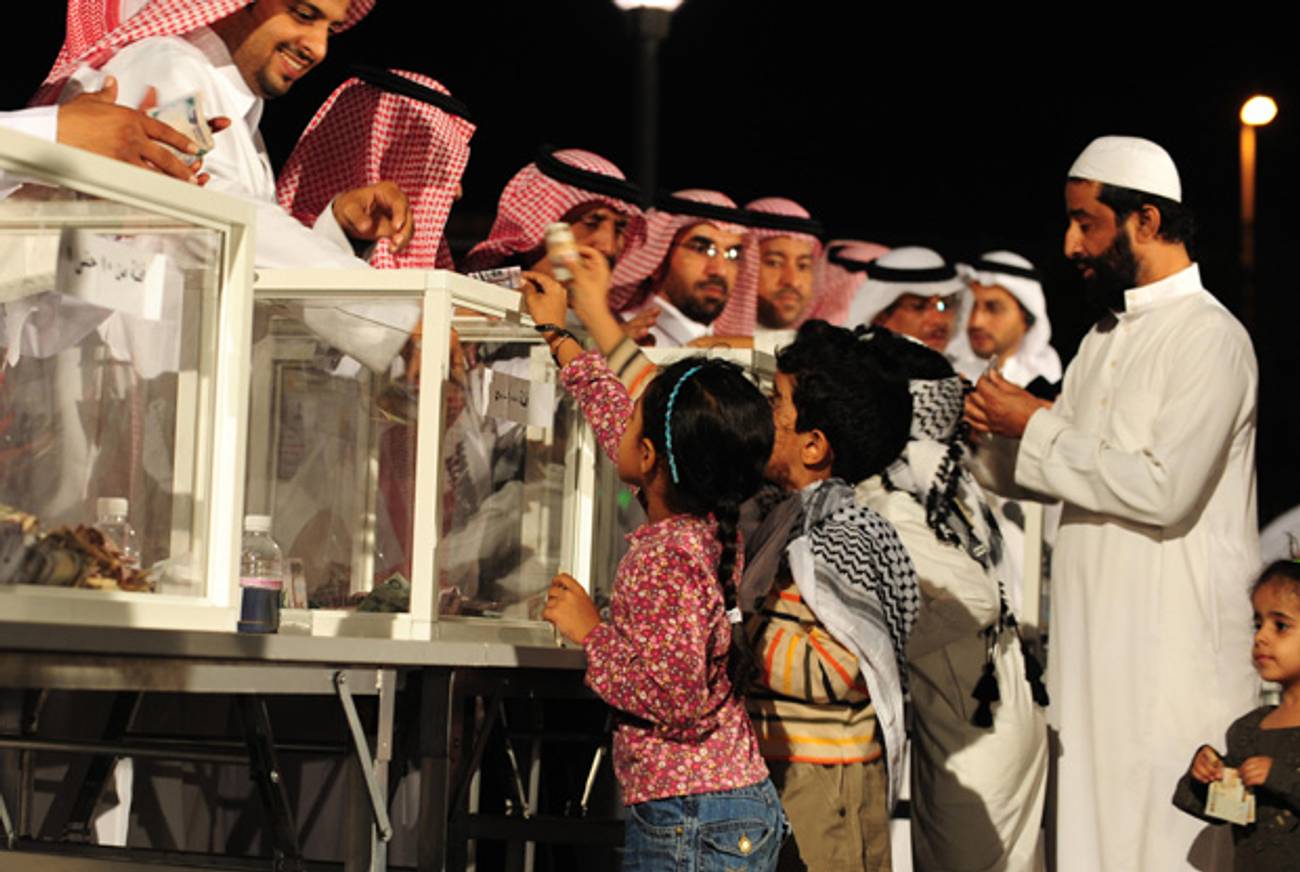Hamas’ Lifeblood: Money
Saudi charities fund terrorists and their families—including Hamas’ late military chief Ahmed Jabari




On Nov. 14, Ahmed Jabari’s life ended when the head of Hamas’ so-called military wing was killed in an Israeli missile strike that kicked off Operation Pillar of Defense. Whatever one imagines about Jabari’s true aims, one thing’s for certain: His life’s work and his ascendancy would not have been possible without the support of a network of charities based in countries such as Saudi Arabia, Yemen, and Lebanon that provide financial incentives that help swell Hamas’ ranks and bolster its popular support. Jabari’s story—and the story of Hamas—is as much about money as it is about blood.
In its video obituary for Jabari, Al Jazeera let the man rarely seen in public speak in his own words. Addressing a cadre of terrorists in training, Jabari spoke of the twin pillars of Hamas: jihad and da’wa. The first is now a familiar term to Western ears, but the second is known only in the provenance of terrorism experts. Da’wa literally means “calling,” but Jabari, who served for many years as head of the Al Nur Prisoner Society in Gaza, was undoubtedly referring to Hamas’ wildly successful network of mosques, schools, and charitable institutions that have served as the backbone of the movement for a generation.
Jabari, like other Hamas operatives, not only was employed by the Prisoner and Orphan Society (now called the Al Nur Prisoner Society), a Hamas-run charity in Gaza, he also was a direct beneficiary of cash subsidies from Hamas patrons like the Saudi Committee for the Support of the Intifada Al Quds. Jabari began his terrorism career in Fatah and was first arrested by Israel in 1982 at age 22. But while serving a 13-year sentence in an Israeli prison during the 1990s, he converted to Hamas and went on to marry one of the daughters of Abdel Aziz al-Rantisi, the Hamas co-founder assassinated by Israel in 2004.
Together with hundreds of other Hamas operatives, Jabari was released by Yasser Arafat at the beginning of the Second Intifada. In 2001, while working under the tutelage of Salah Shehadah, then head of Hamas’ military wing, he received a $2,655 payment from the Saudi Committee for the Support of the Intifada Al Quds through his wife’s account for his time served in a Palestinian jail. That payment alone was equivalent to two years’ average salary in the Gaza Strip. He was hardly alone in receiving Saudi support. Ra’ed Atar, another senior Hamas commander who was targeted by Israel the same day Jabari was killed, received a similar payment from the same Saudi charity. So did Jabari’s announced successor, Marwan Issa, who now heads the Qassam Brigades and served with Jabari on the executive council of the Al Nur Prisoner Society.
In the years preceding the U.S. invasion of Iraq, Saddam Hussein’s payments to the families of Palestinian suicide bombers—up to $25,000 per family—received a great deal of attention. But the fact is that the Saudis, Iranians, and a wide array of Gulf state charities affiliated with the Muslim Brotherhood have spent the past decade vying for influence in the Palestinian territories by funding Hamas’ da’wa network and providing substantial payments to the families of “martyrs” killed in the conflict with Israel, former security prisoners like Jabari, and the families of terrorists still held in Israeli prisons.
Much of the money has flowed through Lebanon. The Iranian regime, for example, has channeled its support through the Lebanese branch of its Martyrs Foundation, while the Muslim Brotherhood has relied upon its own institutions. Historically, both the Iranians and the Saudis have placed an emphasis on making direct payments to beneficiaries in the Palestinian territories through the Palestinian banking system, but Hamas also uses its da’wa network in Gaza and the West Bank to institutionalize payments to the families of so-called martyrs and prisoners. Thus, for example, the father of the suicide bomber responsible for blowing up Sbarro’s pizzeria in Jerusalem in 2001 received a payment from the Saudis for more than $5,300, further payment from Iran’s surrogates of $6,000, and yet another payment of $550 from a Hamas-controlled institution in Jenin.
Hamas has been so successful in taking credit for the financial subsidies it has secured for the families of the “resistance” that the cash-strapped Palestinian Authority, forever struggling to catch up to its rival, has devoted vast sums to reward the families of terrorists imprisoned by Israel. For example, on June 28, 2010, Prime Minister Salam Fayyad approved an updated payment scale for the families of men like Hamas bomb-maker Abdalla Barghuthi who was convicted of murdering 66 people, including six Americans and is serving 67 life sentences. The PA now pays Barghuthi’s family approximately $1,100 a month and that amount will increase to $1,600 a month next year when he logs his tenth year in prison. The PA may be broke, but the Barghuthi family can look forward to receiving each month what the average Palestinian family earns each year.
Why do Western governments like Great Britain, France, Italy, and Austria continue to allow radical Islamic charities to operate freely on their soil and to fund Hamas institutions like Jabari’s Al Nur Prisoners Society? Why do EU governments, facing their own fiscal cliffs, continue to fund the Palestinian Authority’s enormous subsidies to terrorists and their families? Only when Europe and the United States get serious about stopping the flow of money to men like Ahmed Jabari can there be any realistic hope of writing a less grim ending to this conflict.
***
Like this article? Sign up for our Daily Digest to get Tablet Magazine’s new content in your inbox each morning.
Gary M. Osen is a partner at Osen LLC, a New York firm specializing in terrorism financing.
Gary M. Osen is a partner at Osen LLC, a New York firm specializing in terrorism financing.